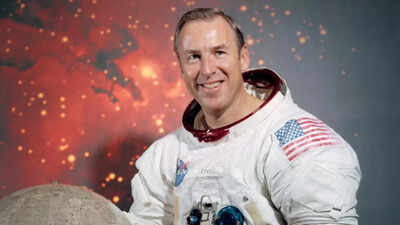ARTICLE AD BOX

Jim Lovell, a celebrated NASA astronaut, passed away on August 7 in Lake Forest, Illinois. His death was confirmed by NASA and widely mourned across the space exploration community, film industry, and beyond.
He was 97.Lovell, the legendary commander of the near-catastrophic Apollo 13 mission, his leadership and unflappable composure during one of the most harrowing crises in space exploration transformed a mission failure into a triumph of human ingenuity and teamwork.Although NASA announced the news of his passing, neither the agency nor his family has yet revealed the cause of his death.Let’s take a look at Lovell’s struggles over the years.
Jim Lovell: From Gemini to Apollo
James A. “Jim” Lovell Jr., the US Navy captain-turned-astronaut, who commanded the Apollo 13 mission, became an enduring emblem of calm leadership amid crisis. Lovell’s extraordinary journey began as a naval aviator and test pilot, culminating in his selection for NASA’s second astronaut group in 1962. Across four remarkable missions, Gemini 7, Gemini 12, Apollo 8, and Apollo 13, he became one of the most experienced and respected astronauts of the era.
Notably, as command module pilot of Apollo 8, he helped make history as part of the first crewed spacecraft to orbit the Moon and return safely to Earth. His leadership commanding Apollo 13, famously marred by an oxygen tank explosion, became a testament to skill, composure, and quick thinking under dire circumstances.The world held its breath during those four tense days, a drama later immortalized in the 1995 Ron Howard film Apollo 13, with Tom Hanks portraying Lovell.
The phrase “Houston, we’ve had a problem” entered public consciousness, epitomizing both the peril and the perseverance of that mission, though it was actually uttered by Jack Swigert, and slightly adjusted for dramatic effect.
However, his trajectory wasn’t without its share of thorns.
Inside the health ‘issues’
Temporary NASA disqualification (Circa 1959): During his tryout for NASA’s early Mercury astronaut selection, Jim Lovell was reportedly temporarily disqualified due to a high bilirubin count, suggestive of a possible liver issue.
This did not persist, and he successfully qualified for the following astronaut group in 1962.However, there is no public record indicating that Lovell faced any notable chronic illnesses, serious health complications, or conditions in his later years. Neither NASA nor the Lovell family has disclosed any illness or cause leading up to his passing.
Inside the Apollo 13 mission
Apollo 13 was NASA’s third planned crewed mission to land on the Moon, but it became one of the most famous “successful failures” in space history.With the goal of landing in the Fra Mauro highlands of the Moon and conducting scientific exploration, the mission launched on April 11, 1970, with Jim Lovell as commander and Jack Swigert as command module pilot.About 56 hours after launch, while en route to the Moon, an oxygen tank in the Service Module exploded. As the blast crippled the spacecraft, causing a loss of oxygen and electrical power in the Command Module, the famous words from Jack Swigert, later echoed by Lovell, were: “Houston, we’ve had a problem.”The crew had to abort the lunar landing and instead focus on survival and returning to Earth. Using the Lunar Module Aquarius as a “lifeboat,” they improvised life-support solutions, navigated manually, and endured extreme cold.After a tense four-day journey looping around the Moon, Apollo 13 splashed down safely in the Pacific Ocean on April 17, 1970.In the years that followed the Apollo 13 mission, Lovell's career shifted from space to business. After retiring from NASA and the Navy in 1973, he served as CEO of Bay-Houston Towing Company and later held executive roles in telecommunications and manufacturing.His memoir, Lost Moon, co-authored in 1994, inspired the film that introduced a new generation to his leadership and humanity.
Apollo astronauts shun superstition 50 years later



.png)
.png)
.png)
















 3 hours ago
5
3 hours ago
5










 English (US) ·
English (US) ·